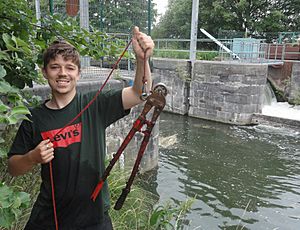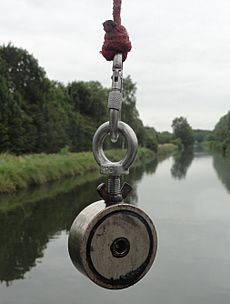Magnet fishing facts for kids
Magnet fishing is a fun outdoor activity where you use a super strong magnet to find metal objects hidden in rivers, lakes, and canals. It's like a mix of cleaning up the environment and going on a treasure hunt!
People who do magnet fishing use powerful magnets. These magnets are strong enough to pull out big metal items. They might find old bicycles, tools, or even car parts from the water. Sometimes, they even hope to discover rare or valuable items. It's believed that magnet fishing started when boaters used magnets to get their keys back after dropping them in the water.
Contents
Tools for Magnet Fishing
To go magnet fishing, you usually need a few things:
- Gloves: These protect your hands.
- Strong Magnet: A special magnet called a neodymium magnet is used. It's tied to a very strong rope.
- Rope: The rope is usually about 15 to 30 meters (50 to 100 feet) long.
- Grappling Hook: Sometimes, people also use a grappling hook. This helps pull up items that the magnet can't grab easily.
Staying Safe While Magnet Fishing
Magnet fishing can be exciting, but it's important to be safe.
- Strong Magnets: Neodymium magnets are very powerful. They can affect electronic devices like pacemakers, so be careful if you or someone nearby has one. They can also pinch your fingers if they snap onto a metal object, so always be aware.
- Hidden Dangers: Sometimes, people find dangerous items like old, rusty metal pieces. Very rarely, they might find old weapons or other risky objects. If you find something dangerous, do not touch it! Tell an adult right away, and they should contact the police.
- Germs: Water can have germs. It's a good idea to wear gloves and wash your hands well after magnet fishing. Make sure your tetanus vaccine is up to date too.
Magnet Fishing Rules
The rules for magnet fishing can be different depending on where you are. What you find might belong to the local government, not to you. It's always a good idea to check the rules for the specific area you want to fish in.
Rules in England and Wales
In England and Wales, many canals and rivers are owned by the Canal & River Trust. They have rules that say you can't take things out of their waterways without permission. If you do, you might get a small fine. They usually don't take legal action for a first offense.
Rules in Scotland
In Scotland, magnet fishing is generally allowed. However, you need to get permission from Historic Environment Scotland and Scottish Canals. If you find anything old or historically important, you must report it to Treasure Trove Scotland.
Rules in Other Places
- Germany: In cities like Hamburg, you need a permit to go magnet fishing.
- Belgium: In Belgium, some amateur magnet fishers have even helped the police by finding old firearms and ammunition related to past crimes. If you find any weapons, you should always contact the police.
- Poland: In Poland, you need a special government permit to have magnetic materials.
- United States: There are no national laws against magnet fishing in the US. However, some states, like South Carolina, require a license for magnet fishing in state waters. In Indiana, you need a permit to magnet fish on public waters managed by the DNR. The magnet must be small enough to be carried and pulled by hand.
Who Enjoys Magnet Fishing?
Magnet fishing has become quite popular! Even some famous people enjoy it, like English rugby player James Haskell. It's a great way to explore, find interesting things, and help clean up our waterways.
|
 | Charles R. Drew |
 | Benjamin Banneker |
 | Jane C. Wright |
 | Roger Arliner Young |




